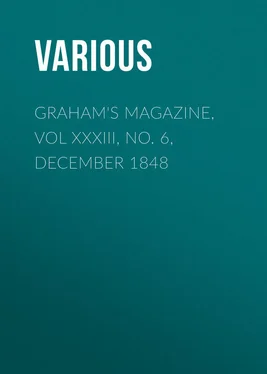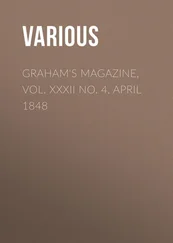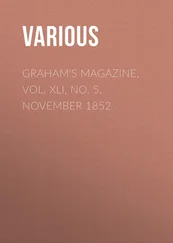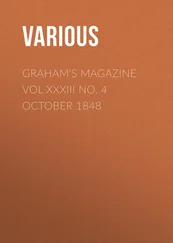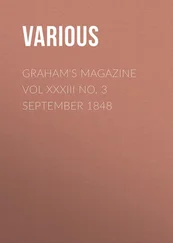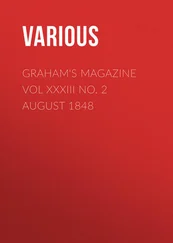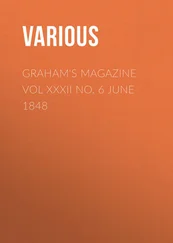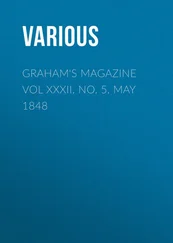Various - Graham's Magazine, Vol XXXIII, No. 6, December 1848
Здесь есть возможность читать онлайн «Various - Graham's Magazine, Vol XXXIII, No. 6, December 1848» — ознакомительный отрывок электронной книги совершенно бесплатно, а после прочтения отрывка купить полную версию. В некоторых случаях можно слушать аудио, скачать через торрент в формате fb2 и присутствует краткое содержание. Издательство: Иностранный паблик, Жанр: periodic, literature_19, foreign_edu, на английском языке. Описание произведения, (предисловие) а так же отзывы посетителей доступны на портале библиотеки ЛибКат.
- Название:Graham's Magazine, Vol XXXIII, No. 6, December 1848
- Автор:
- Издательство:Иностранный паблик
- Жанр:
- Год:неизвестен
- ISBN:нет данных
- Рейтинг книги:4 / 5. Голосов: 1
-
Избранное:Добавить в избранное
- Отзывы:
-
Ваша оценка:
- 80
- 1
- 2
- 3
- 4
- 5
Graham's Magazine, Vol XXXIII, No. 6, December 1848: краткое содержание, описание и аннотация
Предлагаем к чтению аннотацию, описание, краткое содержание или предисловие (зависит от того, что написал сам автор книги «Graham's Magazine, Vol XXXIII, No. 6, December 1848»). Если вы не нашли необходимую информацию о книге — напишите в комментариях, мы постараемся отыскать её.
Graham's Magazine, Vol XXXIII, No. 6, December 1848 — читать онлайн ознакомительный отрывок
Ниже представлен текст книги, разбитый по страницам. Система сохранения места последней прочитанной страницы, позволяет с удобством читать онлайн бесплатно книгу «Graham's Magazine, Vol XXXIII, No. 6, December 1848», без необходимости каждый раз заново искать на чём Вы остановились. Поставьте закладку, и сможете в любой момент перейти на страницу, на которой закончили чтение.
Интервал:
Закладка:
Various
Graham's Magazine, Vol XXXIII, No. 6, December 1848
MILDRED WARD
OR THE DEBUT
BY MRS. CAROLINE H. BUTLER
CHAPTER I
Archibald Dundass was a rich Jamaica planter, whose estates were situated in one of the most delightful regions in that garden of the West India isles. His wife, an English lady, of great personal attractions and highly connected, died when Helen, their only child, had just entered her thirteenth year, an age when, perhaps, a mother's counsel and tender guidance is most required. When the news of Mrs. Dundass's death reached her friends, they immediately wrote, beseeching the bereaved husband to come at once to England with his child, or if not expedient for himself to leave Jamaica, that he would at least suffer the little Helen to come to them; and especially did they urge the plea that thereby he would enable her to receive a more finished education than could possibly be acquired upon the island.
This plea, to be sure, offered a strong inducement to Mr. Dundass; but how could he school his heart to this second bereavement. Helen possessed all her mother's traits – her dark blue eyes – her golden hair and skin of dazzling purity – the smile that played around her dimpled mouth – her light airy step, were all her mother's. Looking upon her thus in her budding loveliness the Helen of his youth once more moved before him. To yield her up he could not – and therefore Mr. Dundass rejected the oft-repeated entreaties of his English friends. Helen remained in Jamaica. A governess was provided, and whatever money could secure in the way of learning was most freely expended.
Mr. Dundass possessed many noble traits of character, yet pride was a very strong ingredient in his composition leading him not unfrequently into errors which his sober judgment condemned. Still he was generally beloved, especially by his slaves, to whom he was a kind, indulgent master. Knowing himself to be one of the richest, if not the richest proprietor upon the island, it was natural he should mark out an alliance for his daughter commensurate with the fortune her hand would bestow. When, therefore, Helen, beaming and beautiful as the star of evening, burst from the confinement of the school-room to dazzle all eyes and move all hearts, what wonder that pride and ambition swelled the heart of Mr. Dundass. But
"Love will venture in where it daur nae weel be seen;"
and, unfortunately for the realization of those ambitious dreams, a mutual love had already sprung up between Helen and a young man without friends or fortune, whom her father had received into favor, and employed for some years in his counting-room.
To appeal to Mr. Dundass for his sanction to their union Ward knew would be vain, and he therefore prevailed upon the imprudent Helen to elope with him, assuring her that her father's anger would be but momentary, and that his great affection triumphing over resentment, would compel him to forgive her error, and open his arms to welcome her return. But, unhappily, it was not so. There was no moving the heart of Mr. Dundass to forgiveness. His anger and resentment were as boundless as had been his love. He refused to see his child, spurned her from his door, and to all the numerous and penitent letters she addressed him, gave no reply. The blow was, indeed, a heavy one, coming from one so idolized; his affections, as well as his long-cherished pride, were crushed, and his resentment rose in proportion.
In the meantime Ward had removed to a distant part of the island with his young and beautiful bride, where he had obtained a situation which promised to be lucrative. That he loved his young wife who for his sake had renounced wealth, station, and a father's love, cannot be doubted; but that he also held a corner of his heart for the possessions she might inherit, is also certain. His disappointment, therefore, at the inflexibility of Mr. Dundass was extreme, and mingled with it a bitterness which, in a short time, displayed itself toward his unoffending wife, and in an irritability which, ere the end of a twelvemonth, caused his employer to dismiss him from his service. From that time the life of poor Helen was most wretched, bitterly reaping in tears and poverty the fruits of disobedience. From place to place she followed her husband wherever he could obtain employ, but of which his idle, dissolute habits soon deprived him. A constitution naturally feeble sunk under the inroads of dissipation. Ere three years a wife Helen became a widow. Her situation was now truly deplorable. Without money, without friends, and thrown upon the cold charity of the world ere yet she had reached her twentieth year. For the sake of her innocent babe she resolved to make one more appeal to the mercy of her father.
Over mountain ridges, through deep valleys – crossing dense forests and treacherous rivulets – sometimes on foot, sometimes indebted to the kindness of some chance traveler for a few miles ride, Helen at length drew near the home of her childhood, and stole, unannounced, into the presence of her father. The moment was propitious. Mr. Dundass had already learned the death of his son-in-law, and the probable destitution of his daughter. In those three years alienation from his only child he had suffered much, and untimely old age had silvered his temples and worn deep furrows o'er his brow. Not all his wealth, not all the goadings of disappointed ambition, nor even the sting her ingratitude had left, could drive her image from his heart, or check the still small voice of conscience, which whispered that not even her errors could excuse the harshness with which she had been repulsed. The death of Ward seemed to unite Helen once more to him. Over her misfortunes he shed bitter tears; and although pride still rebelled against the yearnings of his heart, and made him resolve he would never more admit her to his presence, yet even at the moment when she fell fainting and exhausted at his feet, he was meditating some measures by which he could place her and her little one above want. Ah! pride, anger, enduring obstinacy, where are ye now? There was a well of love in that old man's heart whose depths ye had not yet probed. One look at the sad, care-worn face of Helen; one glance at the innocent babe pillowed upon her breast, and that fount of love was unsealed. The father took them to his breast and blessed them.
CHAPTER II
A few years and Helen, more beautiful than ever, again made her appearance in society, and again Mr. Dundass cherished his darling dream of her forming some high connection. Little Mildred, in the meanwhile, having been sent to England under the charge of a faithful nurse, to receive her education.
A second time, however, was Mr. Dundass doomed to disappointment. The charming and attractive young widow gave her hand to Mr. Donaldson, a Scotch gentleman, whose only recommendation in the eyes of Mr. Dundass was a showy exterior and a superb set of teeth. He had known him for many years, and had always regarded him as more shrewd than honest, and one who, where his own interests were concerned, would let no scruples of conscience stand in the way of his advancement. He thought him rich, but he had much rather he had been poor, if able to boast a titled descent. The idea, therefore, of this second marriage of his daughter gave him in reality as little satisfaction as the first. His reluctant consent was, however, at length obtained, and Helen borne off a second time a bride from her father's house.
The plantation of Mr. Donaldson was delightfully located in a most lovely region of hill and dale, sparkling with delicious rivulets, and sprinkled with charming groves of the deep-tinted pimento, the graceful palm, and magnificent cotton-trees, and the air rife with the fragrance of the orange and citron blossoms, through which, like winged jewels, glanced birds of the most brilliant plumage. Whatever may have been the errors which Mr. Dundass detected in the moral character of Mr. Donaldson, he was a most tender and devoted husband; and in this paradise to which he had brought her, the happiness of Helen seemed perfect. The Cascade, as Mr. Donaldson had named his station, from the numerous little rills and waterfalls in the neighborhood, was distant fifty miles from Mount Dundass, yet the intercourse between father and daughter continued uninterrupted until the infirmities of age pressing upon Mr. Dundass, rendered his visits to the Cascade less frequent, and the cares of a growing family confining Mrs. Donaldson more closely at home.
Читать дальшеИнтервал:
Закладка:
Похожие книги на «Graham's Magazine, Vol XXXIII, No. 6, December 1848»
Представляем Вашему вниманию похожие книги на «Graham's Magazine, Vol XXXIII, No. 6, December 1848» списком для выбора. Мы отобрали схожую по названию и смыслу литературу в надежде предоставить читателям больше вариантов отыскать новые, интересные, ещё непрочитанные произведения.
Обсуждение, отзывы о книге «Graham's Magazine, Vol XXXIII, No. 6, December 1848» и просто собственные мнения читателей. Оставьте ваши комментарии, напишите, что Вы думаете о произведении, его смысле или главных героях. Укажите что конкретно понравилось, а что нет, и почему Вы так считаете.
